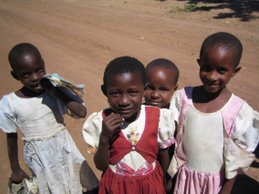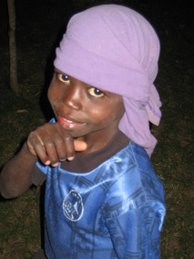Gihembe refugee camp
Many people don't realise that Rwanda is the home of many thousands of refugees stemming from different conflicts in the region. This week I visited one of the largest refugee camps in the country, Gihembe, which is about an hour north of Kigali quite close to Byumba, a Rwandan town with a fairly large population in the middle of a tea growing region that provides jobs for about 60,000 people. Gihembe is home to about 17,500 Congolese refugees many of which have been living there almost ten years now.
Ten years.
There are still regular reports of violence in the border areas of the DRC from which they fled. Despite massive funding cuts and UNHCR's (UN High Commission for Refugees) hope that the refugees will voluntarily return soon, stability doesn't look promising across the border. Especially after yesterday's reports that there has been fighting in Kinshasa and Jean-Pierre Bemba, the runner up in last year's election and the DRC's opposition leader, has been accused of treason. The Rwandan government wants the refugees to return, but after one attempt a few years ago which saw the refugees attacked as soon as they arrived in the Congo and back at the camp within a few weeks, it seems unlikely that they will be convinced as long as their home continues to experience regular outbreaks of violence.

The camp itself is a few kilometers from Byumba, set high on the top of a nearby hill. From the distance you can make out the white sheeting the refugees are given by UNHCR to constuct their houses. Byumba itself is at a high altitude and quite cold at night, the refugees in Gihembe are all the way at the top of the hill and only have the sheeting to insulate them from the rain and wind and thin UNHCR issue blankets to block out the cold. It's rainy season and every night I spent in Byumba the pouring rain woke me up repeatedly. Sleeping under plastic sheeting, most of the time torn plastic sheeting, wet and cold must be virtually impossible.
There were many, many children in the camp, crowds of them followed me around all the time I was there. Some of the camp workers told me that one of the biggest problems in the camp is the lack of food. Refugees are only given very limited supplies of maize and cooking oil and often must sell some of their ration so they can supplement their diet with fruit and vegetables and buy clothes and other necessary supplies that aren't provided. Some lucky refugees have found low-paying jobs within the camps, but many more have to search outside for work and find that their status affects the positions they can take and reduces their pay considerably. Family planning efforts are having virtually no effect in the camps as families purposefully increase the number of children to increase their food rations. A six month old baby is given the same monthly food ration as an adult, many refugees see only the short term food gain in having another baby and not the long term consequences of even more mouths to feed and backs to clothe.
The staff I spoke to at the camp were quite amazing - in the face of hard and depressing working conditions and wages that with inflation get lower each year they are trying their best to help the people under their care. One of things I was told repeatedly was that the scarce resources and status of the refugees within Rwanda makes it very difficult for them to adequately provide for families and that the biggest losers tend to be adolescent girls. Sexual exploitation becomes almost inevitable when the girls aren't given clothing within the camps, their parents can't afford to provide it, they can't work and they have no other way to dress themselves than to find an older man who will buy them things or otherwise prostitute themselves.
A lot of sexual abuse occurs when women and girls leave the camp in search of work or firewood in remote areas. Counsellors told me that in Congolese culture rape is taboo to discuss and therefore many women don't come forward and talk about what has happened to them. They have been working hard to sensitise the community and encourage women to come forward, but this hasn't been help by the refugees status. Because they are not Rwandan, refugees accused of rape will only face jail for a few days before they are let go and return to the camp. There seems to be no way to hold prisoners indefinitely no matter what the crime.
On Thursday, I had my own rather frightening experience of this. When I first arrived at the camp a guy in handcuffs came up to me and shouted a bit and staff led him away telling me he had gone crazy after experiencing the war in Congo. They seemed resigned to him and treated him as if he was harmless so I didn't think any more about it. Thursday morning one of the refugees was leading me through the medical area to find someone I had a meeting with when suddenly she ran through the gate to the compound and it was locked just in front of me. I turned around and the crazy man was running at me shouting "Why are you afraid of me" as I tried to back away from him. He pushed me and kicked me before security managed to grab him and take him away and I slipped through the gate. I thought after that he would have been locked up, but in the evening when I was about to leave the camp he appeared and chased after me again but this time there were more people around that took him away before he could get too close to me.
The next day, after he had been sent to the mental hospital in Kigali, the camp director told me that the guards were afraid of him because he had killed both his parents. The prisons wouldn't keep him because he was a refugee and not Rwandan. He had been sent to the mental hospital in Kigali many times but they always discharged him after a few days and returned him to the camp, she hoped that this time he would be kept there but the prospects were slim.








4 comments:
Hi Natasha, Such a crazy and sad story. I'd be a little shaken up, but I'm glad the staff were there to help.
See you soon!
Sue
Natasha,
Hello. I was very interested reading your blog here. I am thinking of pursuing a PhD looking at the impact of the refugee status on community development in long term refugee camps. You raise many points here which are of relevance; exploitation of young women, strategies of child birth, and the ability to regulate community security. I would like to get your further opinion on what you think the refugee status, for long term camps, could benefit from.
Best of luck,
NRK
I enjoyed reading your blog this morning. i visited Byumba with my son last year. i am currently writing a book about the experience and wondered if you would be happy for me to footnote your blog site for people to read about your visit to Gihembe?
am very happy to understand one of ueropeen country disscussing to our camp am leave their am refugie but am feel happy to se your blog my contavt is inzayimirinho@yahoo.fr
Post a Comment